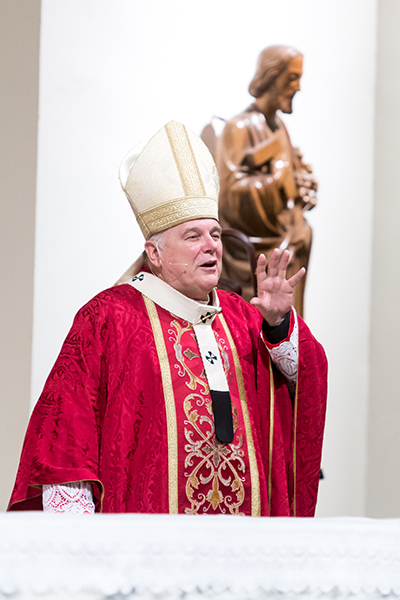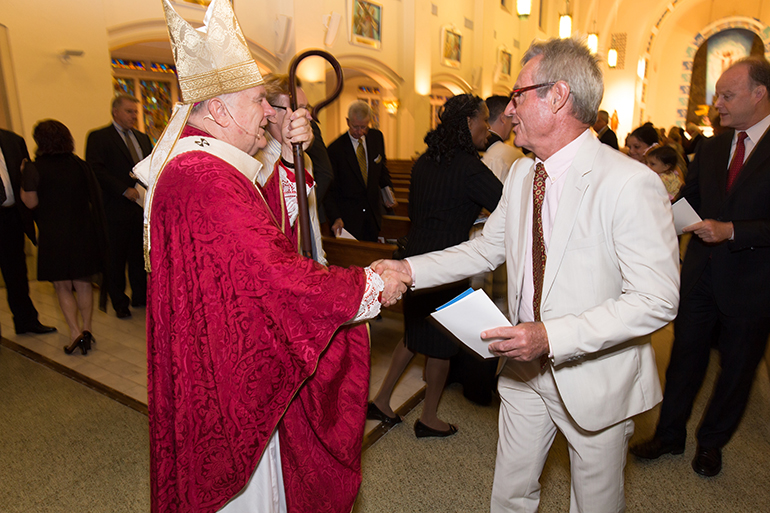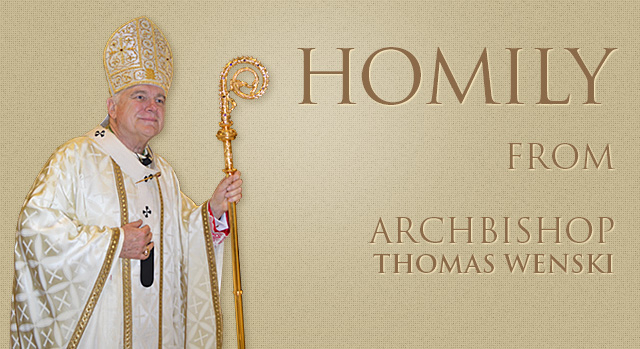By Archbishop Thomas Wenski - The Archdiocese of Miami
Archbishop Thomas Wenski preached this homily during the Red Mass with the St. Thomas More Society of South Florida, June 9, 2016, at St. Anthony Church in Fort Lauderdale.

Photographer: TOM TRACY | FC
Archbishop Thomas Wenski says some parting words at the conclusion of the 27th annual Red Mass for the St. Thomas More Society of South Florida, celebrated June 9 at St. Anthony Church in Fort Lauderdale. Local lawyers, judges and other legal professionals were on hand for the Mass.
I was privileged to hear Pope Francis speak to a joint session of Congress this past September. I got a seat in the upper gallery courtesy of Congressman Alcee Hastings. It is interesting to note that several reliefs of notable persons are enshrined on the walls in the upper gallery - among them are two popes, and the great law-giver, Moses. Looking up to the image of Moses directly across from the dais, the Pope said to the assembled representatives and senators: "Yours is a work which makes me reflect in two ways on the figure of Moses. On the one hand, the patriarch and law-giver of the people of Israel symbolizes the need of peoples to keep alive their sense of unity by means of just legislation. On the other, the figure of Moses leads us directly to God and thus to the transcendent dignity of the human being. Moses provides us with a good synthesis of your work: you are asked to protect, by means of the law, the image and likeness fashioned by God on every human face."
I think what the Pope says applies not only to those in the legislative branches of government but also to you who, because you are officers of the court, represent in one way or other � either as attorneys or judges � the judicial branches of local, state and federal governments.
In order to establish a "more perfect union," our forefathers envisioned a "divided government" as the best way to keep in check the baser instincts of our fallen human nature that would open the door to tyranny and oppression. The "rule of law" was to prevail over the "rule of men." But hyper-partisanship has given us not so much a "divided government" as a "paralyzed government" � and increasingly because of this paralysis in the legislature branch we see instances of overreaching in both the executive and the judiciary. Pundits talk about an "Imperial presidency" and about "activist courts." And so we hear on cable news shows that the voters who are "angry and frustrated" � and to be sure more than a little uninformed � are looking for candidates that "can get things done." But with one candidate under investigation by the FBI, and another a reality TV show star, the bench doesn't seem to be too deep.
The Pope has also said that rather than an age of change our era is a change of an age. That perhaps can help explain this strange and unsettling electoral cycle. We sense that our country and our culture is indeed undergoing a transformation that is as unprecedented as it is unpredictable. Implicit in this change of an age is a crisis of values and a crisis of leadership. And behind the ange and frustration of many people is simply fear.
What’s ahead of us in the years and decades to come, given this crisis of leadership, as pressing problems such as terrorism, unsustainable entitlements, a broken immigration regime, increasing inequality resulting in some way from the creative destruction of a globalized economy continue to vex us?
As members of the bar and the judiciary, as legal professionals, you gather here this evening in St. Anthony's to invoke the power and wisdom of the Holy Spirit and the intercession of Saint Thomas More to guide you in your deliberations as men and women who, by the grace of God, are members of Christ's faithful and citizens of this great nation. In the Congress, the words "In God We Trust" are displayed prominently. Your presence here this evening shows that these words are most than just a pious platitude. "In God We Trust" is a rule of life.
Of course, it was once commonly recognized that the essential American legal principles of equality, rights and government by consent were derived from the laws of God, articulated in the Declaration of Independence under the general appellation of the “Laws of Nature and of Nature’s God,” and incorporated into the various state constitutions and the federal Constitution. Moses, the law-giver of Mount Sinai, didn't get enshrined in Congress by accident.
A critical distinction in our Anglo-America legal tradition � something once taught in the first year of law school � is the distinction between actions that are "malum in se" and those that are "malum prohibitum." "Malum in se" are actions that are wrong in themselves. It was assumed that we cannot not know that murder, rape, theft and fraud are wrong � now these things are formally prohibited by legislation but their wrongness exists independently of legislative prohibition. If Florida were to repeal its statutory prohibition of murder, murder would still be wrong in Florida as it would be wrong everywhere. Of course, other actions are wrong because the government says so. A "No right on red" sign tells us that making a right turn on a red light can be wrong in one state while it isn't in another. This is malum prohibitum � a positive law established by a legislator rather than the natural law that can be said to be "written on the human heart."
Yet, many, many people � and this includes some revered members of our courts � no longer hold that there is anything "malum in se." What Pope Benedict has called "the dictatorship of relativism" and Pope Francis has labeled "ideological colonization" has undermined our confidence in the existence of moral absolutes. Natural law � which simply means that the moral law applies to everyone who shares a human nature � is set aside. Now, it is the "I" and its whims that is the ultimate measure. We saw this with Casey v. Planned Parenthood that compounded the error of Roe v. Wade by effectively establishing a new secular religion asserting that everyone has the "right to define one's own concept of existence, of meaning, of the universe and of the mystery of human life."
The stakes are high. Saint John Paul II said at the United Nations in 1995: “Detached from the truth about the human person, freedom deteriorates into license in the lives of individuals, and in political life it becomes the caprice of the most powerful and the arrogance of power. Far from being a limitation on freedom or a threat to it, reference to the truth about the human person � a truth universally knowable through the moral law written on the hearts of all � is, in fact, the guarantor of freedom’s future.”
Now, if any reference to a common truth founded in natural law is ruled out, it still remains necessary to lay down a minimum of norms if human beings are to live together. The only recourse is that of judicial positivism: to seek procedural rules that seek to cover every conceivable circumstance. And today we are bombarded with more and more complicated and often indecipherable rules and regulations. But this ultimately leads to a dead end � and to some real confusion.
We see this confusion, for example, in the debate about immigration. The phrase "What is it about 'illegal' you don't understand?" is used to trump all debate. (The use of the verb here is purely coincidental.) To label a “criminal” both someone who commits actions that are malum inseand someone else whose only wrongdoing is the commission of actions that are merely malum prohibitum is to use language confusingly. Certainly there can be legitimate debate over how open our borders should be. But merely calling “illegal” immigrants “criminals” does not settle the matter. “Illegal” immigrants are “criminals” only because government policy declares them to be or treats them as such � in the same way that persons openly practicing Christianity or Judaism in Soviet Russia were “criminals” only because government policy declared them to be. And conversely, if government policy determines that something is "legal" like abortion, then the current conventional wisdom is "if it's legal it can't be wrong." Without reference to a common truth "derived from the Laws of Nature and Nature's God" people feel set adrift � and this is the reason for their fear which they project angrily onto the immigrant, the outsider.
When a democracy bases itself on moral relativism and when it considers every ethical principle or value to be negotiable (including every human being's fundamental right to life), it is already, and in spite of its formal rules, on its way to totalitarianism. The might of right quickly becomes might makes right.
Let me end this reflection repeating once again the words of the Holy Father in Congress. "The figure of Moses leads us directly to God and thus to the transcendent dignity of the human being. Moses provides us with a good synthesis of your work: you are asked to protect, by means of the law, the image and likeness fashioned by God on every human face."
This is a beautiful task but a grave responsibility and so we pray with you and for you, "Come Holy Spirit, fill the hearts of your faithful and kindle in them the fire of your love. Send forth your Spirit and they shall be created. And You shall renew the face of the earth. O, God, who by the light of the Holy Spirit, did instruct the hearts of the faithful, grant that by the same Holy Spirit we may be truly wise and ever enjoy His consolations, Through Christ Our Lord, Amen."

Photographer: TOM TRACY | FC
Archbishop Thomas Wenski greets local lawyers, judges and other legal professionals at the 27th annual Red Mass for the St. Thomas More Society of South Florida, celebrated June 9 at St. Anthony Church in Fort Lauderdale.

